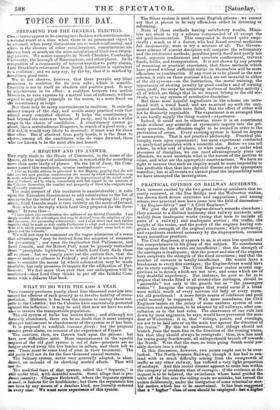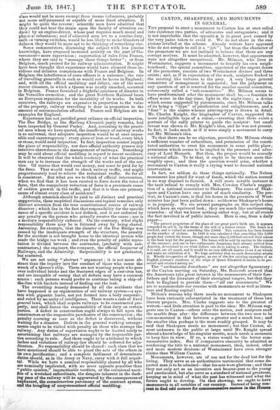PRACTICAL OPINION ON RAILWAY ACCIDENTS. Tun interest excited by the
two great railway accidents that re- cently occurred, at the Dee Bridge and the Wolverton station, has drawn forth divers strictures and suggestions ; and among others, two practical men have come into the field of discussion- " An Engine-driver" and "A Civil Engineer." We give the pith of the Engine-driver's remarks elsewhere : they amount to a distinct testimony that railway accidents arise mainly from inadequate works (using that term to include all parts of a railway) and inadequate service ; the traffic, the weight of the trains, and the power of the engines having out- grown the strength of the original structures ; while parsimony, and expedients rendered necessary by the disproportion, occasion many hazardous practices.
The Civil Engineer, it appears to us, is at once less specific and less comprehensive in his grasp of the subject. He corroborates the opinion that the works are insufficient ; that the strength of. the carriages is inadequate; that the power and size of the engines have outgrown the strength of the fixed structures ; and that the number of servants is totally insufficient. He would have a breaksman to every five carriages ; the Engine-driver would have one to every carriage. The Civil Engineer makes several sug- gestions as to details which are not new, and some which are of very doubtful expediency. For instance, he goes so far as to propose that breaks fitted to all second-class carriages, should be _ accessible" not only to the guards but to "the passengers within"! Imagine the stoppages that would occur if a break were within reach of every nervous old lady or every eccen- tric old gentleman 1 A more fertile source of confusion and peril could scarcely be suggested. With more soundness, the Civil Engineer insists on the policy of some uniform system of con- struction and regulation, to be adopted by all railways, after con- sultation as to the best rules. The observance of one rule laid- down by most engineers, he says, would have prevented the acci- dent at Wolverton : it is, that "sidings, points, and crossings, are not to be laid into or on the main line against the direction of the trains." By this we understand, that sidings should not branch from the main line in the direction of the coming traina, but that they should always be retrograde : thus, in a line used for trains going Southwards, all sidings should branch off towardsa the North. Were that the case, no train going South could pos- sibly deviate into a siding. In this discussion, however, two points ought not to be over- looked. The North-western Railway, though it has had to con- tend with as much' difficulty arising from the overgrowth of traffic as any other railway, has suffered a very light proportion of mishaps. And this recent disaster appears to come less within the category of accidents than of outrages : if the evidence at the inquest is to be believed, the switchman whose hand guided the - train off the line into the siding made no mistake, but turned the- points deliberately, under the instigation of some criminal or mor- bid motive, which has to be ascertained. It has been suggested that s " higher " class of meet should be employed: but a higher
class would not be more exempt from insane influences, probably not more- self-possessed or capable of more fixed attention. It
might be quite the reverse: scientific men have admitted that they could not bear the strain upon the faculty of attention en- dure I by an engine-driver, whose post requires much moral and physical robustness; and if educated men set to a routine duty, such as turning switches, would be less likely to make blunders of dulnebs, they would be more apt to be thinking of something else. Some commentators, discussing the subject with less precise knowledge, have proposed increased activity on the part of Go- vernment—more supervision ; importation of rules from France,
_where they are said to "manage these things better "; or from Belgium, much praised for its railway administration. It might have been thmight that experience would have silenced these in-
vidious and delusive comparisons with France and Belgium. In Belgium the interference of state officers is a nuisance' the rate
of travelling generally is such as would not be borne inEngland ; and, with all the official meddling and delays, one of the most recent disasters, in which a Queen was nearly smashed, occurred in Belgium. France furnished a frightful specimen of disaster in the Versailles cremation ; and the great Northern Railroad bears
an European reputation for the instability of its works. In both countries, the railways are expensive in proportion to the value
of the property, railway travelling is dear in proportion to the amount of accommodation afforded. France and Belgium are no examples for England.
Experience has not justified great reliance on official inspection. The Dee Bridge, as the Railway Chronicle justly remarks, had
been inspected by General Pasley. And, according to the practi- cal men whom we have quoted, the insufficiency of railway works is so universal,- that adequate inspection would be at once impos- sible and supererogatory : every piece of iron or wood, every brick or stone, would need inspection. In fact, inspection cannot supply the place of responsibility, nor does official authority possess any intuitive shrewdness in the management of railways. Something
may be said about official meddling in regard to recent accidents. It will be observed that the whole tendency of what the practical
men say is to increase the strength of the works and of the ser- vice. Of course that would cost money, and must be paid for by the fares. That would tend to check railway traffic, and might proportionately tend to relieve the redundant traffic. So far all is consistent. But what are we to think of official intervention, when we find that it has been exerted to.force down the rates of fares, that the compulsory reduction of fares is a proximate cause of sudden growth in the traffic, and that it is thus one primary cause of almost every class of accidents'? Although attention should be paid to all distinct and practical suggestions, these empirical discussions and topical remedies only distract attention from the true constitutional source of railway disasters ; which lies in the fact that responsibility for the specific cause of a specific accident is not defined, and is not enforced by any penalty on the person who actually creates the cause ; nor is
mediate responsibility enforced. On the contrary, what slight responsibility there may be is frittered away by being shared.
Assuming, for example, that the disaster of the Dee Bridge was caused by the inadequate strength of the structure, the penalty for the accident is not brought home to the identical person who made the bridge too weak ; and even the penalty of public repro- bation is divided between the contractor, (probably with sub- contractors,) the engineer, the company, the official Inspector of Railways, and the Admiralty. Responsibility is not graduated, but scattered.
We are not using " abstract " argument : it is not more ab- stract than the inquiry into the conduct of those who cause the
wreck of a Queen's ship. There are not wanting people who pore over individual bricks and the fractured edges of a cast-iron bar, and are incapable of seeing that all defects may have a common source : such persons would prefer to continue baling a ship-of- the-line with buckets instead of finding out the leak. The overriding remedy demanded by all the accidents that have happened is an organization of our railway system—a sys- tem with gigantic limbs, not yet formed into a body corporate, and ruled by no unity of intelligence. There wants a code of fixed general laws, which shall require railways to be constructed pro- perly, and shall fasten the responsibility of that duty on certain parties. A defect in construction ought always to fall upon the constructors or the responsible purchasers of the construction ; the penalty accruing as soon as the defect is discovered, without waiting for a disaster. Defects in the general working arrange- ments ought to be visited with penalty on those who manage the railway. Any duties of supervision ought to be limited solely to ascertaining that railways are managed by the responsible par- ties according to rule. And there ought to be a tribunal to which laches and violations of railway-law should be referred for adju- dication. No responsibility should be shared : each class that we have mentioned should be able to plead the acts of the others in its own justification; - and a complete fulfilment of determinate duties should, ss in the Army or Navy, carry with it full acquit- tal. While we have a nominal responsibility shared by all who are nominally implicated, with no more apposite penalties than "public opinion," impracticaWe verdicts, or the occasional sacri- fice of a wretched subordinate, the dangers inherent in the dash- ing pace of the railway will be aggravated by the consequences of haphazard, the conscienceless parsimony of the contract system, and the bungling of unsystematized official meddling.



























 Previous page
Previous page